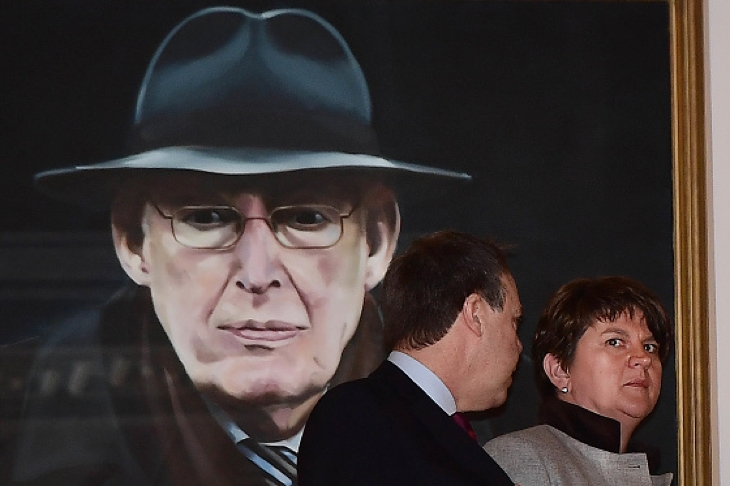And so there we have it. Shortly after midday in Stormont, Sinn Féin’s Michelle O’Neill declined to nominate a replacement for Martin McGuinness, causing the collapse of the power-sharing executive after five months shy of a decade. At 5pm, authority to hold elections passes, under the Northern Ireland Act 1998, to Secretary of State for Northern Ireland James Brokenshire. By custom (though not law) these are held after six weeks. Sometimes the election you get isn’t the one you want.
And Northern Ireland, which last went to the voters all of eight months ago, is now slouching towards snap election mode. Each party will bid for support from its ideological extremes: the Belfast Telegraph, under a headline ‘Polls Apart’, shows Arlene Foster in a Fermanagh Orange hall, and Máirtín Ó Muilleoir on the Falls Road at the Felons Club (where full membership is limited ‘to those who have been imprisoned or interned for their Irish Republican beliefs’). The DUP are hitching their election wagon to clearing their dear leader’s name. Sinn Féin has unveiled its slogan for the hustings: ‘Get even.’ So much for a promising fresh start.
And in case things weren’t quite acrimonious enough, the Assembly Members (Reduction of Numbers) Act 2016 means this election—the first after May 2016’s—will see the number of MLAs reduced from 108 to 90. The smallest parties—the Greens, People Before Profit, independents like Claire Sugden— will be most up for the chop, against the well-oiled electoral machines of the big parties. (A shame, too, as these tiny parties are the cracks in the sectarian pavement.) Polling suggests the overall party position will be much the same: the DUP on 33 (down from 38), Sinn Féin on 24 (from 28), the UUP on 11 (from 16), SDLP on nine (from 12), and the cross-community Alliance Party holding its eight.
Three weeks of negotiations will follow, to form an executive to take the place of the Foster-McGuinness duumvirate. You’d not want to bet the house on them succeeding. It’s not like the maths will have changed. And then—what? You hear rumblings of direct rule from London, or some form of joint administration by Westminster and Dublin, but both would require emergency legislation and the second is only slightly more fanciful than the first. More likely is a lengthy period with no executive, just party grandstanding on all sides, during which Brokenshire increasingly comes to wish he had remained a lawyer.
Northern Irish politics is in a crisis of leadership, with the supremely talentless Arlene Foster a prime case in point. Yet leadership is precisely what’s needed, and if the parties in Northern Ireland are unable to supply it, it falls on the shoulders of the Government and the Secretary of State.
Even more nightmarish than one election is two—which Brokenshire has told MPs is a possibility if an Executive fails to form. It’s like Groundhog Day, just with Gerry Adams. And what if the Supreme Court rules that triggering Article 50 requires the consent of the devolved administrations? There will be no one in Belfast to pick up the telephone. Brexit could be a hostage to a breakdown in Stormont.






Comments